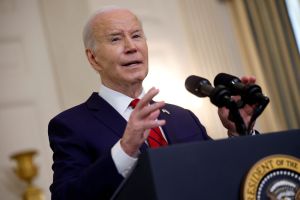I was distracted from the argument of the second report by Peter Navarro into the 2020 election, which someone had demanded I read, by it suddenly bursting into capital letters: ‘Prong One dramatically INCREASED the amount of absentee and mail-in ballots… Prong Two dramatically DECREASED the level of scrutiny… This pincer movement resulted in a FLOOD of illegal ballots.’
So it went on: ‘to dramatically INCREASE’, ‘to dramatically DECREASE’, ‘illegal ballots able to FLOOD’, ‘INCREASE the flood’. It was like trying to listen to an interview on television while a photo-bombing cat kept whizzing past on a skateboard.
I had an idea I had seen something like this before. Then I remembered: ‘Let Lapidoth rejoice with Percnos — the Lord is the builder of the wall of CHINA — REJOICE. For the Lord is my ROCK and I am the bearer of his CROSS.’ It was in Christopher Smart’s magnificent but fragmentary ‘Jubilate Agno’, a long poem composed between 1758 and 1763, when he was confined in a private madhouse in London kept by a Mr Potter.
‘Let Paul rejoice with the Seale, who is pleasant and faithful, like God’s good ENGLISHMAN,’ Smart argues. ‘For I paid for my seat in St PAUL’s, when I was six years old, and took possession against the evil day.’ It is quite convincing in a poetical way, but the words in capital letters seem to signal emotional agitation rather than smoothly conveying information.
Smart’s rejoicing in an occasional outburst of capital letters must have been influenced by the practice of the committees responsible for translating the Bible for King James I. This venerable so-called Authorized Version translates the name of God represented by the sacred Hebrew tetragrammaton, YHVH, as ‘the LORD’, with reverential capitalization. Smart too was a biblical translator, publishing his verse version of the Book of Psalms.
In less obviously insane contexts, readers feel that words in capital letters represent the author shouting. When President Donald Trump resumed tweeting from the Walter Reed hospital after being laid low by COVID-19, it was easy to imagine him raising his voice: ‘The Stock Market is getting ready to break its all time high. NEXT YEAR WILL BE THE BEST EVER. VOTE, VOTE, VOTE!!!!!’ Then came a series of tweets all in capitals, so it was not easy to tell whether he was still shouting or whether he’d forgotten to take off the Caps Lock: ‘STRONGEST EVER MILITARY. VOTE!’
Does Trump think writing all in capitals is a convenience to those of meaner intellect? The idea far predates Twitter. In Great Expectations, the young Pip writes a letter on his slate to the kind blacksmith Joe Gargery: ‘i OPE i SHAL SON B HABELL 4 2 TEEDGE U JO AN THEN WE SHORL B SO GLODD AN WEN i M PRENGTD 2 U JO WOT LARX.’ Of this, the almost illiterate Joe is able to make out only the J-O of his own name.
That was in the days of hornbooks: boards printed with the alphabet in capitals and small letters, and covered with transparent horn so that children could trace the letters though it, as though through plastic. They began with the capitals, because small letters were used for joined-up writing, which was much harder to read. Now we seldom see cursive script, since we get emails, if we’re lucky, instead of hand-written letters.
So, what with the myth that capital letters are easier to read and the convention that they shout, some newspapers embrace headlines all in capitals — and others eschew them. ‘KIM & KANYE GO BUST,’ yelled the New York Post the other day. ‘Hong Kong Police Round Up Dozens of Opposition Figures,’ announced the Wall Street Journal on the same day, with its quaint habit of using initial capitals for most headline words. Someone must know the theory behind capitalizing ‘Up’ but not ‘of’. Beats me.
Yet the accepted theory over the past century in the journalistic world has been that words all in capitals are in fact harder to read. Since capital letters are blocky, without ascending and descending elements, the notion goes, they are less easily distinguishable. Some recent revisionist studies based on eye movement suggest that capitals can in fact be read just as quickly, it’s just that most readers are more accustomed to upper and lower case.
When capitalized words escape from headlines into the text, it’s as annoying as those advertisements online next to something you are trying to read. Advertisers know that movement catches the eye, so as you scroll down, they keep some human image poised at eye level with an occasional wave of the arm or wiggle of the butt. The poor reader’s eye is enticed away like a kitten thrown a ball of wool.
It is infuriating — worse than a deaf signer popping up on the screen next to a police chief at a news conference. That piece of well-intentioned distraction reaches its high point in Northern Ireland. In that province, deaf people use either the signing conventions of the Republic of Ireland or the completely different sign language of mainland Britain. Therefore broadcasters take care to ensure that two signers flap, on either side of the politician speaking, like zanies mobbing the Duchess of Malfi.
The equivalent in print is to write your name in capital letters. Not many sane people do that, but companies try to. Asus is a computer company that likes to spell itself ASUS. Ikea, the merchants of ready-to-assemble furniture, prefers to call itself IKEA. It’s not as if Ikea is pronounced letter by letter (like Tammy Wynette’s ‘D-I-V-O- R-C-E’). It just wants to stand out in a crowd.
Similarly the coronavirus disease, with its unpleasant habit of pushing in where it is not welcome, drew attention to itself early on by establishing its name internationally as capitalized COVID-19. By analogy with Aids, it is much better brought down to size as Covid-19. It’s bad enough having to read about it all the time without its name reduplicating into a pandemic of capital letters.
This article was originally published in The Spectator’s February 2021 US edition.


















